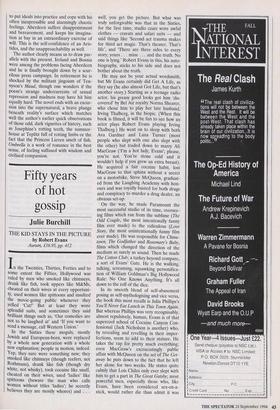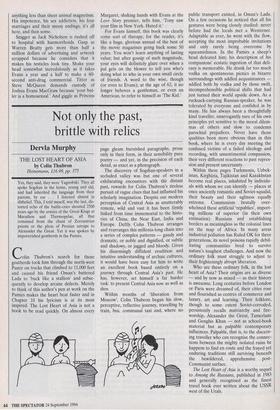Fifty years of hot gossip
Julie Burchill
THE KID STAYS IN THE PICTURE by Robert Evans Aurum, 116.95, pp. 412 In the Twenties, Thirties, Forties and to some extent the Fifties, Hollywood was ruled by men who smoked like chimneys, drank like fish, took uppers like M&Ms, cheated on their wives at every opportuni- ty, used women like spittoons and insulted the movie-going public whenever they yelled 'Cut!' But at least they wore splendid suits, and sometimes they said brilliant things such as, 'Our comedies are not to be laughed at' and 'If you want to send a message, call Western Union.'
In the Sixties these moguls, mostly Jewish and European-born, were replaced by a whole new generation with a whole new explanation; people in motion, indeed. Yep, they sure were something new; they smoked like chimneys (though reefers, not Rothmans), drank like fish (though dry white, not whisky), took cocaine like snuff, cheated on their wives, used 'ladies' like spittoons (beware the man who calls women without titles `ladies'; he secretly believes they are mostly whores) and . . . well, you get the picture. But what was truly unforgivable was that in the Sixties, for the first time, studio czars wore awful clothes — cravats and safari suits — and said things like 'Second act trauma makes for third act magic. That's theater. That's life', and 'There are three sides to every story; yours . . . mine . . . and the truth. No one is lying.' Robert Evans in this, his auto- biography, sticks to his side and does not bother about the truth.
He may not be your actual wordsmith, but Mr Evans certainly did Get A Life, as they say (he also almost Got Life, but that's another story.) Starting as a teenage radio actor, his greasy good looks got him 'dis- covered' by Bel Air royalty Norma Shearer, who chose him to play her late husband, Irving Thalberg, in the biopic. (When this book is filmed, it will be fun to see how an actor plays Robert Evans playing Irving Thalberg.) He went on to sleep with both Ava Gardner and Lana Turner (most people who slept with one also slept with the other) but traded down to many Ali MacGraw (I'm a hot lady, Evans'; please, you're not. You're stone cold and it wouldn't help if you grew an extra breast). He acquired a fair cocaine habit, lost MacGraw to that sphinx without a secret on a motorbike, Steve McQueen, graduat- ed from the Laughing Academy with hon- ours and was royally busted for both drugs and conspiracy to murder a drug dealer, an obvious set-up.
On the way, he made Paramount the most successful studio of its time, oversee- ing films which ran from the sublime (The Odd Couple, the most intentionally funny film ever made) to the ridiculous (Love Story, the most unintentionally funny film ever made). He was responsible for China- town, The Godfather and Rosemary's Baby, films which changed the direction of the medium as surely as sound. Then he made The Cotton Club; a turkey beyond compare, a sort of Evans' Gate. He is the walking, talking, screaming, squawking personifica- tion of William Goldman's Big Hollywood Rule: No One Knows Anything. It's all down to the roll of the dice.
In its smooth blend of self-abasement posing as self-mythologising and vice versa, the book this most recalls is Julia Phillips's You'll Never Eat Lunch in This Town Again. But whereas Phillips was very recognisably, almost repulsively, human, Evans is of that supercool school of Cocaine Canyon Con- fessional (Jack Nicholson is another) who, by revealing and revelling in their imper- fections, seem to add to their stature. He takes the rap for pretty much everything; even MacGraw's excruciatingly public affair with McQueen on the set of The Get- away he puts down to the fact that he left her alone for two weeks. He states quite calmly that Lois Chiles only ever slept with him to get a part in The Great Gatsby; most powerful men, especially those who, like Evans, have been considered sex-on-a- stick, would rather die than admit it was anything less than sheer animal magnetism. His impotence, his sex addiction, his four marriages and their messy endings; it's all here, and then some.
Snigger as Jack Nicholson is rushed off to hospital with haemorrhoids. Gasp as Warren Beatty gets more than half a million dollars of advertising and artwork scrapped because he considers that it makes his testicles look tiny. Shake your head somewhat incredulously as it takes Evans a year and a half to make a 60- second anti-drug commercial. Titter as Steve McQueen demands custody of Joshua Evans MacGraw because 'your but- ler is a homosexual! And giggle as Princess Margaret, shaking hands with Evans at the Love Story premier, tells him, 'Tony saw your film in New York. Hated it.'
For Evans himself, this book was clearly some sort of therapy; for the reader, it's like a huge, glorious annual of the best of the movie magazines going back some 50 years. You won't learn anything of lasting value; but after gossip of such magnitude, your eyes will definitely glaze over when a pal gets on the blower to tell you who's doing what to who in your own small circle of friends. A word to the wise, though (or even to Evans); at the age of 62, it no longer behoves a gentleman, or even an American, to refer to himself as The Kid.'



































































 Previous page
Previous page